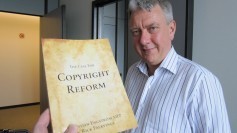Rick Falkvinge's Blog, page 43
May 8, 2012
Seeking Translators For This Blog: Brazilian, Russian, Indian, Chinese, And More

Metaposts: Over the past months, Falkvinge on Infopolicy has slowly become multilingual – observant readers have seen the “English” drop-down in the top left corner and discovered that there are several languages to choose from. Now, it is time to go all-out with the first wave of languages.
If you’d like to see this site in your local language to make the ideas available to more people, you’re more than welcome to help make it happen. FoI (this site) currently exists in German, Russian, Hungarian, and Swedish, in addition to English – and right now, I’m looking for translators into the BRIC countries: Brazilian (Portuguese), Russian, Indian (Hindi), and Chinese (Simplified Han). I’m also looking for more translators into German and Swedish, as well as translators into French, Spanish, and Italian (teams of three or more).
Interested in translating articles you like into your language? Check this page of translators’ notes and see if it could be anything for you. You would commit to absolutely nothing, but become part of the crew running FoI and can translate articles as you see something interesting. You would get a mail whenever there is a new article ready for translation into your language.
If you’d like to help spread the ideas of a sensible information policy by helping them cross your language barrier and translate, contact me! Of course, feel free to forward this invitation to people or teams who may be interested, too.

May 6, 2012
Pirate Party Wins Again, Enters Another Parliament

Pirate Parties: I just came back from the victory party in Schleswig-Holstein, Germany’s northernmost state. The German Piratenpartei has done it again, and entered its third state parliament.
With 8.2% of the votes, the pirates take six out of the 69 seats. This causes problems for the existing coalition in Schleswig-Holstein, as a new constellation is needed.
(Germany consists of 16 states, each roughly equivalent in size to a smaller country in Europe.)
But more interesting is the German Pirate Party’s now-demonstrated ability to deliver again and again and again. People are starting to expect that the pirate platform is a permanent part of policymaking in Germany. That is certainly a huge change from just six months ago, from before the entry into the Berlin state parliament.
It is only one week to go before elections in Germany’s largest state, Northrhine-Westphalia. A lot of media spotlights and politicial analysts are tuning their antennae to the outcome of that election, on May 13. Recent polls place the pirates at 8-10 percent there, well above the five-per-cent hurdle needed to enter that parliament too.
Next year, there are going to be elections to the Bundestag – Germany’s country-wide parliament. That’s when real change starts to happen.
In the meantime, the community of worldwide pirate parties (over 50 of them) learn from these successes and do what we do best: we observe, we copy, we remix, we reuse.
Congratulations, Piratenpartei. See you at the Düsseldorf victory party in a week.

May 5, 2012
The Facebook Fallacy

Privacy: All too often, I hear the word “Facebook” being used as justifications for why people with the connected lifestyle don’t deserve any privacy.
The argument goes along the line of “They publish everything about themselves anyway, there is no way in hell they can mind being wiretapped for the rest.” This is, of course, a complete and dishonest fallacy – and yet I hear it much too often.
People enjoying the connected lifestyle have a very strong sense of privacy – it just happens to be different from those that don’t live their lives online. The sense of the privacy onion – with layers closer to your heart only being shown to your closest group of trusted friends – has varied across the generations, and there’s nothing odd about that. Today, for instance, having a different sexuality than monogamous heterosexuality is no big deal at all that you’d happily publish and even have on your Wikipedia page; one generation ago, however, you kept it close to your heart.
The fallacy is the quite offensive inability to distinguish between voluntarily doing something and being forced to do it. It is the difference between consent and non-consent. Whether somebody thinks there ought to be consent based on his or her frame of reference is completely beside the point.
If I publish information, I do so voluntarily, even if it is information or images that would never have been published a generation ago. If information is taken from me, I get violated, my privacy gets violated.
Too frequently, you hear politicians argue in media that because of how people behave on Facebook, those politicians somehow have a moral right to wiretap everybody to at least the equivalent degree of what some people post voluntarily. This shows a complete lack of understanding not only of the concept of privacy, but also of the concept of consent.
A blogger in Sweden published a rather striking parallel (now offline); “Why do these people not understand the difference between having sex and being raped?”.

April 28, 2012
My Address To The German Piratenpartei Assembly

Pirate Parties: The German Pirate Party’s General Assembly is in progress, with 2800 people gathered in Neumünster – the largest party assembly in Germany’s democratic history, and I’m told the largest in the world, too. I was given the honor and privilege of addressing the assembly, and would like to share my words with the rest of the world here:
Dear colleagues, dear friends, dear pirates,
I am Rick Falkvinge, founder of the Swedish and first Pirate Party.
As you gather here, you are more than a party. You are the heroes of a generation. For the world has changed.
With the net, the previously unsung heroes have begun to tell their stories. Every day, something I see on the net moves me to tears. From joy, from laughter, from happiness.
So when the previous politicians tell us that this or that group is good, is evil, or wants something – when those politicians make themselves into unwanted spokespeople for others, we no longer need to believe them blindly: we can talk to the concerned people directly.
This creates a problem for the old politicians, who have lost the ability to lie to the world. That makes them confused. When it comes to the net and online liberties, those old politicians are behaving like drunken, blindfolded elephants trumpeting about in a porcelain factory.
But for the rest of the world, we are richer than ever before. In this world, a schoolgirl in South America who has just got her first laptop has just as strong a voice as me, a white middle-aged male in the privileged parts of Europe. I think that’s absolutely wonderful, and something worth defending, even if – no, especially if it means that old politicians can’t lie to us anymore.
The net is the greatest equalizer that humankind has ever invented. In fighting for its potential, we are already better at equality than any other party. Not just in Sweden, not just in Germany, but in the world.
Those who call themselves left-wing say you should share with people who are poor when they are in need. We don’t think like that – for we share with everybody, all the time. We don’t share out of pity with the poor – we share because it is who we are, and because we feel it creates a better world.
When people’s voices are threatened by war, censorship, or dictatorships, activists in our ranks make sure that those silenced can still reach out to the world to tell their stories – under our banner or under that of an activist group we’re proud to call our sisters and brothers on the barricades.
So we are better at solidarity, than those who would call themselves left-wing. And we are also better at equality. Not because of how we reason, but because of who we are.
Yet other politicians try to pitch groups of people against each other. Not just the extreme right – this happens all the time. But where old politicians portray differences between groups as a problem, we see people. We see different people, and we celebrate their diversity every single day. Diversity is something positive that should never be allowed to be made into a set of problems between fabricated groups. Once you remove this silly need to sort people into normal and abnormal, you also get rid of the pathological need for invasive surveillance to find the abnormal.
In this, we are an international community fighting for liberty in over 50 countries. Our numbers are growing by the day. Just as Sweden was the starter engine for the movement, the German Piratenpartei is now the shining beacon of our community.
For what we fight for is not rocket science. We demand that the civil liberties that our parents enjoyed in their offline world should carry over to our children in their online world – even if it means that some corporations can’t make money anymore and that some old politicians can’t lie to us anymore.
Because of this very simple demand, we are already better at liberty than those who would call themselves right-wing or liberal, before we have even started talking about all the additional wonderful liberties that the net brings with the connected lifestyle.
Paradoxically, we are also better at conservative ideals than those who call themselves conservative. For where they have sold the ideals of democracy to the highest corporate bidder, we carry the torch of the Enlightenment ideals and its thinkers with respect to those who once gave their lives for our liberty, and demand that this liberty applies on the net too, applies equally to all the people in the world.
In all election stress, it is easy to focus on the here and now. Paperwork, candidacies, recent polls, flyer supplies. But take a minute and listen to the world – using no matter what source – and you will hear the people whispering about us, all over the world, in countries where we are strong and in countries where we are needed.
We are giving people hope - for they see that they need no longer sit down and accept things as they are. We are showing people that they have the power in their own hands to change things. 250 million Europeans who share culture with the world are not a problem; they are a power base of 250 million voters. If they are being painted as a problem, we are showing that they can and should vote the real problem – the old politicians – out of a job.
We are giving people faith – for they see that in the twilight of democracy, where our children’s liberties are being sold to the highest corporate bidder, the system still works and can rescue and repair itself from within.
And perhaps most importantly, we are giving people respect. There is nothing shameful about the connected lifestyle that the net generation lives by, and if the old politicians feel threatened by it and the transparency it demands, people do not need to accept the bad attitude from those politicians. The net generation has every right to demand respect for themselves as citizens, even if it means that the old politicians lose control. That’s part of our gift to the world – of what we share with the world.
So fair winds, my friends. I am honored to call myself your colleague. I am overjoyed at the opportunity to be part of this journey to change the world for the better. I am proud to be a pirate.

April 26, 2012
Norway: Terrorism Fought With Song, Not Surveillance

Europe – Andrew Norton: Yesterday was day nine in the trial of Anders Breivik, the man behind the events in Oslo and Utøya last July. And in keeping with the thoughts expressed by their Prime Minister, over 40,000 citizens expressed themselves outside the court in a way that would chill every would-be terrorist – by not being afraid.
Fear makes people do strange things. When the US was attacked in 2001, fear made people act like lemmings, jumping off the self-interest cliff for some perceived notion of ‘safety’. When London was bombed in 2005, it was used as an excuse to ramp up the already excessive surveillance culture, giving even more powers to the police, despite the attack not being worse than Irish terrorist attacks of the previous decades.
So, when bombs go off in downtown Oslo, followed by an automatic weapon-fueled slaughter in Utøya, in a country with little history of terrorist actions, there’s going to be a massive backlash, right? FEar, panic, people demanding the government do something, ANYTHING to stop these attacks from happening again.
Absolutely not. As I noted last July, the reaction of Jens Stoltenberg, Prime Minister of Norway was promising; “We are still shaken by what hit us, but we never give up our values. Our answer is more democracy, more openness and more humanity, but never naivete.”, but was that typical of the typical Norwegian citizen? It would appear so. One girl interviewed on CNN reportedly said “If one man can show so much hate, think how much love we could show, standing together.” A week later 200,000 people participated in a flower march.
Sure, emotions were running high at the time, so what about later? It’s been a little over 9 months since the incident, and the outpouring of grief and forgiveness has been washed away over time, surely, leaving vengeance and wrath in its place? Apparently not.
Despite provocations, including fist-salutes on entering the court for the first few days, tempers were remarkably even. There has been no anger, rage, irrational calls for violence, or need for special procedures. It’s all been very… CIVILISED.
Nothing has demonstrated this more than the events of yesterday (April 26, 2012) when a crowd of 40,000 gathered outside the courthouse. It wasn’t there to protest, to shout slogans, or make demands, as you would expect in the US or UK. Instead, they sang a song, Barn av Regnbuen (Children of the Rainbow), which Breivik had claimed was used to brainwash children. It was a moving, and poignant insult of Breivik, while showing immeasurable class.
Compare that with the US. Almost 11 years after 9/11, the self-declaired mastermind of that attack – Khalid Shaikh Mohammed – has still yet to be put on trial. Despite being in a military prison for over 5 years, and being charged 3 years ago, he’s still to have any sort of trial. There was a plan to hold the case in a New York courtroom, back in 2009, but then Politics got involved, the Politics of Fear.
A domino effect of people preaching fear and ‘safety concerns’ led to the President deciding that instead of a court case, in front of a judge, he would be tried in a military tribunal – a system setup after 9/11 in some twisted desire for vengeance – in Cuba. The ‘trial’ is due to start in two weeks.
For a country that prides itself as being the land of the free and home of the brave, whose founding document speaks strongly of Justice, and a speedy trial by one’s peers (6th Amendment) by due process (5th amendment) under equal protection of the law (14th), they’ve certainly lost the plot.
The US needs to take a hard look at itself, and perhaps take a lesson or two from Norway where, despite the greater impact of the attack there (1 in 4 (norwegian) in Norway know someone directly affected by the attack), especially with politicians as the main target; things have gone on pretty much unchanged. 11 Men used boxcutters, and billions have been spent in ‘security’, one man used bombs and automatic weapons and there have been no knee jerk reactions.
Norway shows that the effective way to deal with terrorism is not through abandoning privacy, spying on citizens, or turning to naked barbarism. As the UK did in the 80′s and 90′s, it should be dealt with as a crime, without the special venom which only serves to feed more violence and hatred. It takes a strong person to react with intelligence, but only a thuggish fool to react with fear and anger. Alas, things are not going to get better in the US until politics there grows up, and that could be a long time indeed, as the Republican party campaigns on platforms similar to Breivik’s. It’s enough to make you weep.

Europarliament Majority Now Against ACTA; More Pressure Needed

Activism: Recently at a press conference, another party group in the European Parliament came out in rejection of ACTA. This time, it marked a significant milestone, as a majority of the party groups in parliament has now said they will reject it.
It was the liberal group ALDE who declared their intent to reject, yesterday afternoon, European time. According to MEP Christian Engström, who can do the game theory of Parliament in his sleep, this means that there is now a declared majority against ACTA! This majority consists of the Greens (where the Swedish Pirate Party resides), the Left, the Social Democrats, the eurocritical EFD, and the newly-declared liberal group ALDE.
This is tremendously good news, as ACTA as a whole stands or falls in the European Parliament. If the Europarliament rejects ACTA, then it’s a permakill. Boom, headshot. The other side of the coin is that if parliament accepts it, then it is going to shut the doors for very necessary reform for at least a decade, barring a cataclysmic event.
However, this majority against ACTA is not like other majorities, which are predictable and stable. The European Parliament is fairly unique among parliaments, in that the MEPs are neither required (or indeed expected) to toe the party line, and while the party whip exists, it is mostly of the fun kind. A recommendation, if you like. Deviations from the declared party line is not only common but expected in pretty much every vote. So even though the party groups have declared their party lines, this has no effective binding force on the people doing the actual button-pressing, and it’s the tally of them that counts in the end.
This mechanism works both ways, of course. The largest party group, the conservative EPP, is still weakly in favor of ACTA – but even there, many Members of the European Parliament are expected to go against the party line and vote against it.
A draft opinion was introduced in ITRE, the Industry Committee, this Tuesday. Monopoly hawks are trying to frame ACTA as being about the right to property or not (which is hogwash). We need to reinforce that the people of Europe will not stand for this mail-order legislation from monopolists that erode our freedoms of speech and fundamental liberties,
The current committees working on ACTA are JURI, INTA, DEVE, ITRE, and LIBE (those four-letter words are committe names). The time is now to mail the members of these committees and express your feelings about why this piece of bullshit mail-order corporate favor needs to be soundly rejected by a parliament elected by the people. You can use this web page (in Swedish, but understandable) to quickly get the e-mail addresses of the members of the respective committees. Do so now. Right now and over the following weeks. All several million of us. To make sure that all several million really do that, make sure that your friends of those several million are aware of the situation.
It won’t hurt if you tailor your criticism of ACTA to reflect why you’re mailing the respective committee, of course. So JURI is Legal Affairs, INTA is International Trade, DEVE is (third world) Development, ITRE is Industry, and LIBE is Civil Liberties. A message that has an early indication that shows that the message is tailored to its recipient is taken much, much more seriously. Feel free to replace just that particular tailoring between committees and keep the rest of the mail identical.
And in breaking news, I’m just informed that JURI has postponed its vote for a month – the Greens and Social Democrats were against postponing and wanted to kill ACTA outright, but this did not happen. A very very important reminder that it ain’t over until the fat lady sings.
We’re balancing on a very thin line here. And the safety net has been taken out. It’s up to us to guarantee the survival of our own civil liberties, but the good news is that it only takes a small piece of action from several tens of thousands each to make a huge difference. I’m informed from the inside of the European Parliament that the citizens’ pressure on Parliament to reject ACTA has weakened noticeably. Now, exactly now, is the time to ramp it back up.
So mail those committee members now. Today. Right Effing Now.

April 24, 2012
Book Release: The Case For Copyright Reform

Copyright Monopoly: Today, a book that I have co-authored with Christian Engström (pictured), Member of European Parliament, is released with celebrations and signing in the European Parliament. The book is The Case for Copyright Reform.
The book is a compilation of the strongest articles on reform of the copyright monopoly from Christian Engström (MEP) and myself, edited into book format for readability and bedside-table friendliness for those who want the whole story in the same place and in an easy format.
It not only shows the problems with today’s situation, and traces them back to the history of the copyright monopoly, but also presents a comprehensive proposal detailing how things can be fixed, and shows how the proposal resolves the problems with today’s situation. The proposed solution is realistic and politically doable – not to mention that it has been picked up by the entire Green group in the European parliament.
The book also features parts from Mike Masnick (at Techdirt), Ernesto (at TorrentFreak), and Michael Geist (with acknowledgements).
You can download it here or buy a paper copy here. Other electronic formats are available at the book’s dedicated site. The book is released into the public domain; Creative Commons Zero.
Enjoy, and do let me know what you think! Is this kind of compilation useful to you? (To be honest, Christian and his assistant Henrik did the editing to book format from the individual articles. Credit where credit is due, etc.)

April 23, 2012
Artists Worldwide, Time To Show Support For Liberties And The Pirate Party

Infopolicy: Apparently, some older artists – those who are lucky enough to live off of monopolies from times past rather than actual production or performance – have come out in Germany opposing the Pirate Party there. I know that for every artist opposing monopoly reduction and civil liberties, at least ten artists are in favor of the pirate program. This is a time when we and the German Piratenpartei need visible artistic support.
The copyright monopoly lobby in Sweden tried this stunt, too. They would push forward ten artists in a highly visible op-ed in print media, decrying the portrayed evils of the Swedish Piratpartiet, and on top of that, having the audacity to claim they didn’t oppose us for their own sake, but for “the next generation of artists”. Of course, this was utter hogwash and bullshit, but we needed to show that it was utter hogwash and bullshit. So for every artist the copyright lobby put forward signing such an op-ed, we always responded with an op-ed of our own with at least double the number of artists from just that next generation – or triple or more. The lobby learned its lesson quickly. There was just no way the copyright monopoly lobby could outnumber the pirate support quantitively from the artists’ camp, and this was visible as daylight in the mainstream press.
This is the stunt we have to repeat right now for the German Piratenpartei, in light of the lobby trying the exact same thing in Germany. The future needs artists of all signs, types, genres and colors to display support for copyright monopoly reform and for civil liberties, and to do so openly, and right now.
One excellent example is Dan Bull in the UK who just released a torrent aiming for the top charts. Another perennial positive example is Nina Paley in the States.
Can we put up a website for this purpose, perhaps, to show artists’ support for the pirate platform in all kinds of ways (and let artists self-express their support)? Once people in general realize that the parasitic middlemen are not artists, and that they only speak in their own interest as middlemen, the narrative shifts completely.

April 22, 2012
Yet Another Server Outage

Metaposts: Ok, so the server went down in flames and smoke just as I had left for a presentation in Moscow, Russia. As I came back home and started troubleshooting, I realized things were worse than I thought.
It was yet another hard drive problem – I was seeing superblock I/O errors all over the logs, and the server had dismounted the file system to read-only. After trying with a new SSD drive, and then another (which I had ordered to my home while in Russia), which all showed the same symptoms, I realized it was the SATA circuits on the motherboard that were fried and giving me disturbing intermittent failures, rather than the hard drives.
So, rummaging through the spares, I found a PCI SATA adapter which would bypass the motherboard’s SATA circuits. No game. The server would install fine, but BIOS would not boot into that hard drive (it was an Adaptec 1210 card).
Two options remained. The first was to get a PCIe SATA adapter that was different from the PCI SATA and hope that the BIOS would be able to transfer control to that hard drive. The second, last option, would be to get an IDE-to-SATA adapter to feed the SSD off the ATA interface on the motherboard, which hopefully had a different circuit path.
The third and fourth options were increasingly arcane (such as running the system SSD over USB2) and just aimed at getting something running, rather than getting it running in a close to decent way.
Anyway, the shops opened today at 1000 Stockholm time, and the PCIe SATA that I got worked after some trial, error, and reconfiguration. The server is now up and running and I hope this was the root cause of the errors that has been affecting the site off and on since February.

Sweden, Paradise Lost: Part 2 – Private Police Forces

Copyright Monopoly: In our series showcasing Sweden as a country that likes to pretend it champions net freedom, but itself does the exact opposite: did you know that Sweden has given the copyright industry powers of net surveillance that even the Police don’t have?
Sweden likes to portray itself as a country that champions the importance of the net and its freedom, and is never late to criticize other countries, but is one of the worst offenders in the West when it comes to respecting this fantastic tool that upsets the old guard and the status quo.
Today, we look at the curious IPRED law in Sweden. It was introduced in silence and shadow in the summer of 2007 by the Justice Department’s Stefan Johansson, who has also been Sweden’s and the EU’s negotiator at the ACTA table, and who has frequently been seen at Sweden’s Association For Copyright.
The really insidious thing about the IPRED law is its name: it copies the name from a European directive (IPRED), but legislates things that the European directive explicitly doesn’t contain or force Sweden to do. Therefore, politicians of all colors have defended themselves saying that Sweden must implement European Union directives, whereas in reality, they are pursuing their own agenda and trying to wash their hands of responsibility.
The law concerns the copyright industry’s right to violate privacy – specifically, demanding subscriber identities of IP addresses, on allegations of violation of the copyright monopoly (typically, file sharing), and sue them in court where presumption of innocence does not apply. In Sweden, the Police may only break the privacy of identities behind IP addresses when the crime being investigated is severe enough to result in a jail sentence. But most file sharing cases have stayed at fines, and therefore, the Police does not have this power.
So Sweden has granted private corporate interests – the copyright industry – more extensive powers than the Police, in terms of cracking down on the Net and making dissent and civil disobedience dangerous.
As IPRED was voted through on February 25, 2009, the Pirate Party got a significant member boost. When the law took effect on April 1, 2009, the net traffic in Sweden dropped by 40% overnight. (The copyright industry in other countries frequently mentions this as an effective legislation. They fail to mention that traffic levels were back to normal levels six months later, though.)
The first IPRED case has gone as high as the European Court of Justice, and a precedent verdict was handed down a couple of days ago that confirms that the copyright industry can be given more powers than the Police.
An op-ed two days ago asked the best question regarding Swedish information policy: Why is net freedom always a matter for foreign policy, but never for domestic policy?
Next: Tracking you’d only find in (other) police states.
Previous: General Wiretapping.

Rick Falkvinge's Blog
- Rick Falkvinge's profile
- 17 followers



